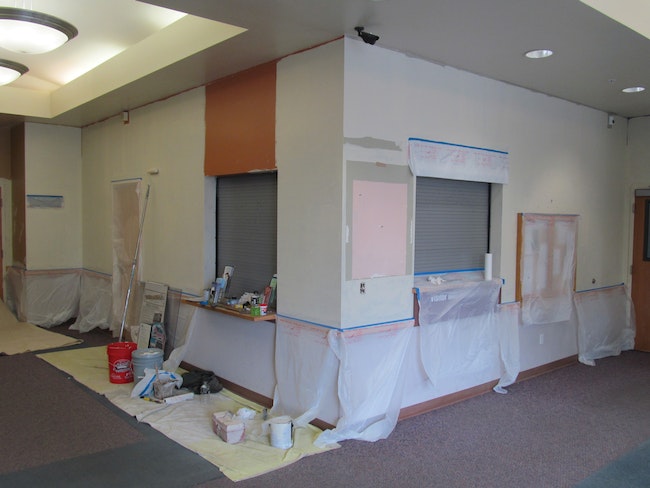 Renovations continue taking place at the library while city leaders deal with the pandemic, public health, and budget concerns.
Renovations continue taking place at the library while city leaders deal with the pandemic, public health, and budget concerns.
If you can imagine trying to rebuild a car engine while it’s running, you might have an inkling about the task that faced the City of Cottage Grove staff as it was trying to figure out its budget for 2020-21.
Cottage Grove operates not on the calendar year, but a fiscal one. The start of the new budget begins July 1, with the goal of making it through financially until June 30, 2021. There are a number of state laws and policies in place that dictate the budget process from start to finish.
That process took an unhealthy wallop upside the ledger books in the form of COVID-19. City Manager Richard Meyers described the results of this intrusion of the virus into the process in his letter introducing the budget:
“The 2020-21 Proposed Budget preparation has been the most challenging budget I have ever attempted to compile. It is different from all previous budget processes from the beginning of the preparations to how the Budget Meetings are conducted. The impacts of the coronavirus, the resulting COVID-19 illnesses and the subsequent responses by the Federal, State and local governments and businesses, has created a situation where even the best estimates are totally and completely just guesses. Preparing this Proposed Budget has truly felt like budgeting with a blindfold on.”
In speaking with Meyers, he related some of the stress and anguish he and his team wrangled with as they tried to turn a bunch of wild, ever-changing guesstimates into the balanced budget required by state law. For instance they knew that both the gas and transient room tax revenues would take a hit, but how much? Revenue estimates ranged from 12% to over 40%. Another unknown was the duration of the losses; would it be six months or stretch until 2023? The announced Federal COVID-19 relief funds specifically excluded local governments from receiving any of the pie, and State of Oregon funds, at the beginning, didn’t seem to be forthcoming.
“Our first priority was maintaining essential services,” Myers said. “Police services, water, sewer, street services, and service functions have to be maintained for a safe and healthy community. We also wanted to be supportive in jump-starting our local economy in finding ways to assist our local businesses through projects, grants and loans. Very important to the process was to be conservative with estimates, not being drastic or overly optimistic. We wanted to leave some room for adjustments during the year. If there is one word to describe it is ‘flexibility.’ I want to underline that. We need to be able to adapt as things unfold.
“We had to make some tough choices to make the budget work,” he continued. “Some have already been made in the current budget so we can enter the new fiscal year with a little better cash carryover. We issued layoff notices to 20 employees on April 1 (15 part time and five full time) beginning May 2. One full-time layoff was rescinded before the layoff date and seven part-time employees have returned to work after being off for several weeks. The other laid-off positions are the staff at the Library (four full time and six part time) and Finance (two part time). A number of other vacant positions (summer interns and temporary worker positions in Public Works and Development and assistant to the City Manager) were frozen and not filled. That is a shame because many of these are our local high schoolers and college students returning for the summer. They really have done great work in the past with so many projects,” Meyers said.
Part of the decision with the library employees was that it was not possible to have the library open due to the state regulations. Part of the budget strategy was to try and preserve money during this period of forced closure so that they will be available when it is possible to reopen the Cottage Grove Library. “We are cautiously optimistic that in August we can incrementally begin to open up the Library, but will depend on state guidelines and conditions. The library operations will definitely look and feel different to keep patrons and staff safe,” Meyers said.
To share an example of how things may work with the library reopening, Meyers talked about what occurred with the city-owned Middlefield Golf Course. “The course was closed and most of the staff laid off. We made changes and when we had things in place, and it appeared safe to do so, we reopened the course on May 1.” Now you may be thinking, “How is golf important?” Actually the course is an essential element of our wastewater system. It is illegal and costly (fines start at $10,000) to dump effluent back into the river. The links act as a filter to allow the treated water to be used by the vegetation without going back into the river, resulting in considerable savings. This capacity is being increased by the construction of the 14 million-gallon effluent holding pond behind the water treatment plant. This will allow for redundancy and potential future population growth. The golf course, in addition, provides city income as well.
Having the community center/library closed has opened up an opportunity to do much-needed renovations. “I’m talking about jackhammer-level projects that would have been impossible while the center was open. We are creating space for the senior and disability services and the Cafe 60,” Meyers said. These are housed at Community Sharing. Having a much bigger space and upgrades will benefit the program along with it being a more accessible location. Sounds like a win-win situation.
Until the library is able to reopen the local “Friends of the Cottage Grove Library” are planning to do what they can in the face of reduced summer programs. The group’s president, Bruce Kelsh, had this to say: “When the doors of a library close, there is a big hole in a community. A gap, an empty space. People miss our library. It plays an important place in people’s lives. For young parents, children, teens, and adults the library can be a special place. I understand the financial and public health challenges of our library reopening when there is a pandemic. It will be complicated. But with creative and innovative thinking, library services can be delivered and accessed in new ways, similar to how schools have had to change what they do during these strange times. The library may need to reopen in quite a different way. In the meantime, (we) are creating a program this summer to help support children with their reading, to provide books for families. As a community we need to find ways of filling the gap until our library reopens.”
To learn more about these coming events check your local media resources such as “Around the Grove.”
***
Meyers also related that there are some major projects in progress that are hiring local firms and residents such as the “Safe Routes to School” and reworking parts of the antiquated storm water systems.
Many of the 75-year-old manholes are brick construction and the mortar is failing, leaking water and overloading the system. Lining these manholes will lessen the water entering the system and save considerably in the long term. Keeping this construction money local will help the local economy as well as improve the quality of life.
Investigating the circumstances behind the closing of the library has exposed me to a much larger and more complex question. And that is, “How does our city operate and make sure that things we tend to take for granted happen?” It is neither simple or straightforward in the best of times. Especially now in the midst of the strange times of the Coronavirus.
This is the process by which the City of Cottage Grove achieves its required balanced budget:
A proposed budget is prepared by city staff under direction of the city manager.
That is brought to the City Budget Committee which is composed of the Mayor, City Councilors, and seven members of the public appointed to the committee by the City Council. There are two official notifications of the public budget meeting inviting the public to inspect the proposed budget and seeking input.
The Budget Committee met May 5, in a virtual format. There were 10 spaces available for citizens without technology access to gather and participate in the meeting. The Committee was tasked with going through the 248-page document reviewing the budget and recommending any changes and responding to citizen input on budget items.
Then the amended document was approved by the committee.
The next step is for the City Council to approve this budget. That could happen at the June 22 council meeting. There is still a chance for slight adjustments to be made at that time but state law limits not more than 10% changes to the budget once it has been approved by the committee.
Meyers said he was proud of the “incredible work” by all involved in this lengthy process. The staff who worked hard and under pressure to try and see through stone while making the predictions, the departments who pulled together to figure out what they could do without, the volunteer committee members who spent many hours studying the documents and trying to make the best decisions for their community, and all the citizens who voiced their views, all are part of what makes this a special place.
“This is what I love about Cottage Grove, having the city staff and departments who work together and are not armed camps fighting with each other. I think it reflects the larger community and how we do things here,” Richard Meyers said.
If you would like to know more about the workings of city finance and governance I suggest exploring the City’s website. There is a wealth of information on all aspects of our city and its workings.
You may learn that there is more to the picture than it seems at first. I know I sure have!
Be safe and cautious. We will get through this together!
You can write to Dana at [email protected]






